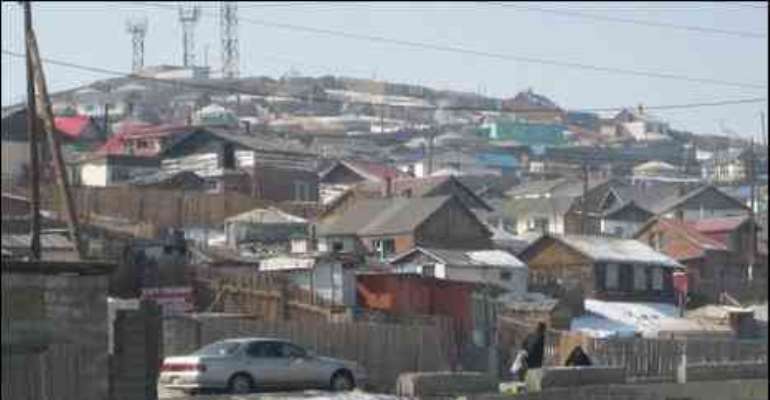MONGOLIA ON VERGE OF MINERAL BOOM

In a tasteful black and chrome interior, there are rails of perfectly placed turquoise jackets. There are shoes and belts, and black beaded tops with a price tag of over $700 (£460). This is the brand new Emporio Armani store off Sukhbaatar Square, Ulan Bator, Mongolia.
In sub-zero temperatures, it is hard to believe you could find a place warm enough to wear these clothes in Mongolia. And who will shop here when a third of the population live below the poverty line?
But the high-end Western brands that are opening up in the Mongolian capital are looking to the future, and what promises to be a lucrative market.
Mongolia is about to experience an unprecedented boom. By 2013, the mining of some of the world's largest unexploited mineral deposits will begin to herald a transformation of the economy.
In 2008, the GDP of this former Soviet satellite state was $5.3bn. In the next decade, that could triple.
“That is realistic,” says D Zorigt, Mongolia's minister for mineral resources and energy. “These are world-class mines.”
Mineral-rich
Mongolia has virtually every desirable mineral resource. Gold, copper, coal, uranium, iron ore and oil all lie below the earth of this huge landlocked nation. We hope mining will drive a new wave of industrialisation, so that we can increase the skill set of Mongolian people and manufacture modern products ourselves
D Zorigt, Mongolian minister for mineral resources and energy
But it is the development of the gold and copper mine at Oyu Tolgoi in the south Gobi region that is most eagerly anticipated.
Anecdotally, the size of the deposit is said to be as large as the island of Manhattan, enough to keep mining there for the next 60 years.
The Mongolian government has retained a 34% stake in it after lengthy negotiations with Ivanhoe Mines and Rio Tinto, the companies contracted to construct and operate the new mine complex.
This alone – without any of the other mining projects that are due to come on stream – will represent a huge increase in government revenues.
“Our first priorities will be education, health, housing and social welfare,” says the minister.
“And we hope mining will drive a new wave of industrialisation, so that we can increase the skill set of Mongolian people and manufacture modern products ourselves.”
Harshest winter
Investment is desperately needed. A third of the population is nomadic and depends on livestock for a living.
Gsogbadrakh came to Ulan Bator after losing 300 animals in the last dzud
But the country is currently experiencing a “dzud” – when a summer drought followed by a severe winter decimates the grazing areas.
So far this winter, over four million animals have died. For many herders who lose their livestock, migration to an urban area where unemployment is high is the only option.
Gsogbadrakh, a widower, came to Ulan Bator with his sons after losing 300 sheep, goats, cows and horses in the last dzud.
They live in a traditional ger on the edge of the city, but Gsogbadrak has been unable to find regular employment, and has survived on social welfare and casual work in construction.
He is not convinced mining will change his prospects and make Mongolia a wealthy country.
“I'm doubtful about that. Of course, if we use our resources wisely it will benefit the country, but I'm not sure I really trust our politicians.”
Sharing wealth
Earlier this week, around 5,000 people took to the streets of Ulan Bator to demand those same politicians fulfil the promises they made during the 2008 election campaign.
Both main political parties pledged to distribute cash handouts of around $1,000 to every Mongolian citizen based on mining revenues.
Opposition MP S Oyun says the country cannot afford the pay-out.
“I think this is a very irresponsible policy. It was an easy way to gain votes in the election because there is so much poverty in Mongolia. The main challenge is to create jobs and income and give a decent living to the people.”
But D Zorigt says the government is still committed to distributing the cash.
“Election promises need to be kept. Otherwise in a young democracy like ours, people lose trust in the government and political parties.
“And we are facing a significant economic downturn because of the global recession. So this should be seen as a way of enhancing consumption.”
Whatever happens with the cash grants, in the short term, it seems likely the harsh winter will increase the numbers of people living in poverty.
Long-term, Mongolians know billions of dollars of new revenue from mining will flood the state's coffers. The challenge for the government will be to spend it wisely.
